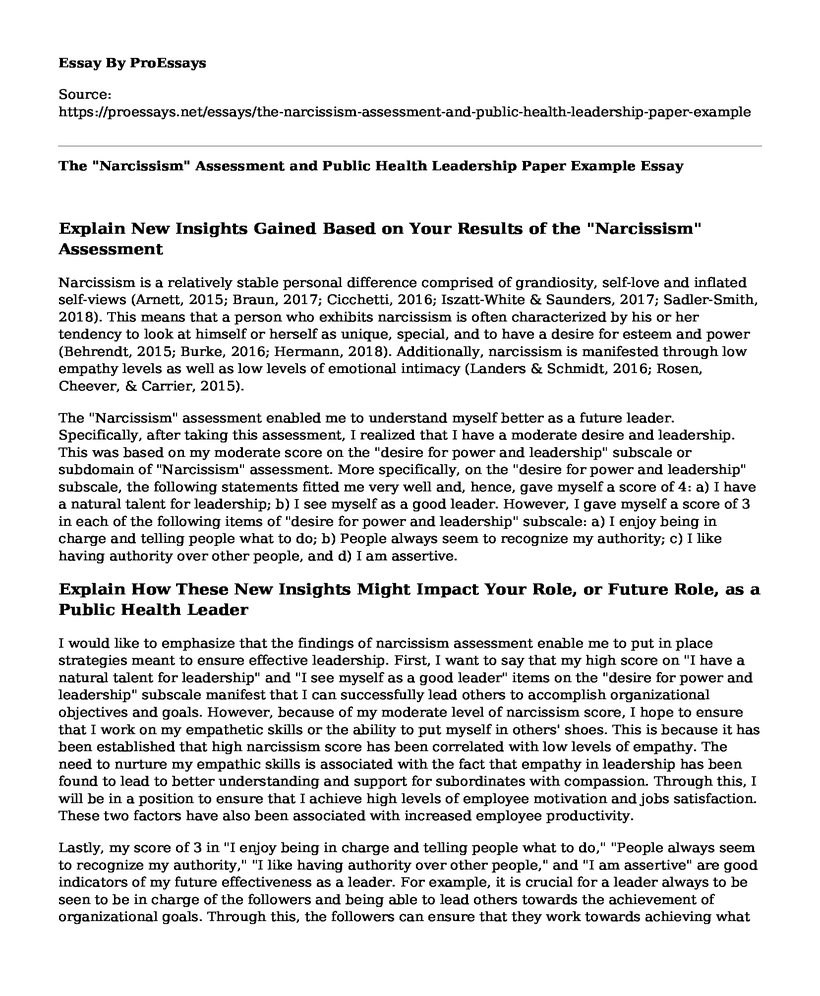Explain New Insights Gained Based on Your Results of the "Narcissism" Assessment
Narcissism is a relatively stable personal difference comprised of grandiosity, self-love and inflated self-views (Arnett, 2015; Braun, 2017; Cicchetti, 2016; Iszatt-White & Saunders, 2017; Sadler-Smith, 2018). This means that a person who exhibits narcissism is often characterized by his or her tendency to look at himself or herself as unique, special, and to have a desire for esteem and power (Behrendt, 2015; Burke, 2016; Hermann, 2018). Additionally, narcissism is manifested through low empathy levels as well as low levels of emotional intimacy (Landers & Schmidt, 2016; Rosen, Cheever, & Carrier, 2015).
The "Narcissism" assessment enabled me to understand myself better as a future leader. Specifically, after taking this assessment, I realized that I have a moderate desire and leadership. This was based on my moderate score on the "desire for power and leadership" subscale or subdomain of "Narcissism" assessment. More specifically, on the "desire for power and leadership" subscale, the following statements fitted me very well and, hence, gave myself a score of 4: a) I have a natural talent for leadership; b) I see myself as a good leader. However, I gave myself a score of 3 in each of the following items of "desire for power and leadership" subscale: a) I enjoy being in charge and telling people what to do; b) People always seem to recognize my authority; c) I like having authority over other people, and d) I am assertive.
Explain How These New Insights Might Impact Your Role, or Future Role, as a Public Health Leader
I would like to emphasize that the findings of narcissism assessment enable me to put in place strategies meant to ensure effective leadership. First, I want to say that my high score on "I have a natural talent for leadership" and "I see myself as a good leader" items on the "desire for power and leadership" subscale manifest that I can successfully lead others to accomplish organizational objectives and goals. However, because of my moderate level of narcissism score, I hope to ensure that I work on my empathetic skills or the ability to put myself in others' shoes. This is because it has been established that high narcissism score has been correlated with low levels of empathy. The need to nurture my empathic skills is associated with the fact that empathy in leadership has been found to lead to better understanding and support for subordinates with compassion. Through this, I will be in a position to ensure that I achieve high levels of employee motivation and jobs satisfaction. These two factors have also been associated with increased employee productivity.
Lastly, my score of 3 in "I enjoy being in charge and telling people what to do," "People always seem to recognize my authority," "I like having authority over other people," and "I am assertive" are good indicators of my future effectiveness as a leader. For example, it is crucial for a leader always to be seen to be in charge of the followers and being able to lead others towards the achievement of organizational goals. Through this, the followers can ensure that they work towards achieving what they have been tasked to do. Lastly, I want to work on my leadership skills to ensure that others do not view me as authoritative but one being capable of accommodating others' views and opinions.
References
Arnett, J. J. (2015). The oxford handbook of emerging adulthood. Oxford, OX: Oxford University Press.
Behrendt, R. (2015). Narcissism and the self: dynamics of self-preservation in social interaction, personality structure, subjective experience, and psychopathology. New York, NY: Springer Publishing.
Braun, S. (2017). Leader narcissism and outcomes in organizations: a review at multiple levels of analysis and implications for future research. Retrieved from https://www.frontiersin.org/articles/10.3389/fpsyg.2017.00773/full
Burke, R. J. (2016). The fulfilling workplace: the organization's role in achieving individual and organizational health. Abingdon, UK: Routledge Publishing.
Cicchetti, D. (2016). Developmental psychopathology, maladaptation and psychopathology. Hoboken, NJ: John Wiley & Sons.
Hermann, A. D. (2018). Handbook of trait narcissism: key advances, research methods, and controversies. New York, NY: Springer Publishing.
Iszatt-White, M., & Saunders, C. (2017). Leadership. Oxford, OX: Oxford University Press.
Landers, R. N., & Schmidt, G. B. (2016). Social media in employee selection and recruitment: theory, practice, and current challenges. New York, NY: Springer Publishing.
Rosen, L. D., Cheever, N., & Carrier, L. M. (2015). The wiley handbook of psychology, technology, and society. Hoboken, NJ: John Wiley & Sons.
Sadler-Smith, E. (2018). Hubristic leadership. New York, NY: Sage Publications.
Cite this page
The "Narcissism" Assessment and Public Health Leadership Paper Example. (2022, Dec 20). Retrieved from https://proessays.net/essays/the-narcissism-assessment-and-public-health-leadership-paper-example
If you are the original author of this essay and no longer wish to have it published on the ProEssays website, please click below to request its removal:
- Google Leadership
- The Lean Six Sigma: NTUC Fair Price Case Study
- Essay Sample on The Evolution of Environmental Thinking in Nursing
- A) What effect is Anzaldua showing readers of mixing English and Spanish?
- Essay Sample on Breaking Barriers: Religion Working to Create Inclusion for the Disabled
- COVID-19: Adapting to a New Normal With Digital Tools - Essay Sample
- Essay Example on Tenants of Unit 248 Seeking Lower Rental Charges Due to COVID-19







